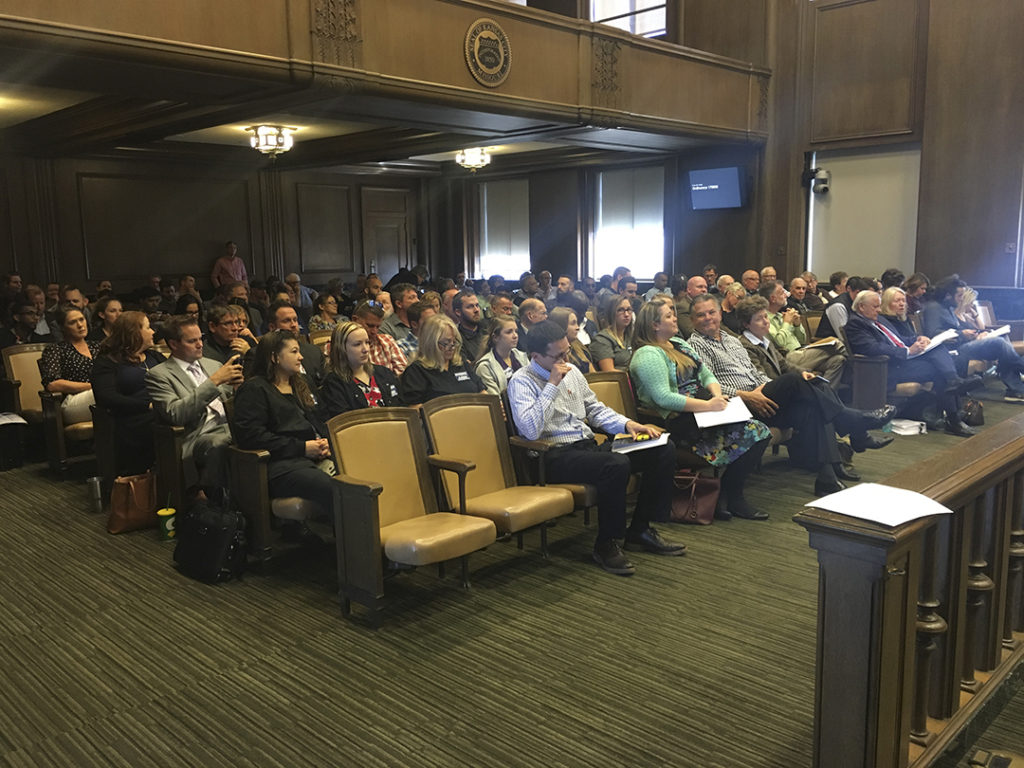 By Paul Thompson
By Paul Thompson
Northeast News
After years of debate, the City of Kansas City, Missouri may be on the verge of a compromise regarding its short term rental regulations.
Since 2015, City staff have been working on an ordinance that will sufficiently regulate the short term rental market in Kansas City. This week, proponents of short term rental platforms such as Airbnb will meet with concerned neighborhood leaders at City Hall, with the intent of bridging the final divides on the issue. Sixth District Councilman Scott Taylor, the chair of the Planning, Zoning and Economic Development Committee, orchestrated the meeting after hearing hours of public testimony on the subject over the past several weeks.
“We intend to pull together a work group of divergent opinions on this to see if we can’t create a Kansas City solution for this ordinance,” said Taylor. “Everyone agrees that we are close. What we’re going to do is to pull together some of the different parties who have shown an interest in being a part of this process.”
The years of fine-tuning have left only a handful of key issues remaining between the opposing factions. By now, even dubious neighborhood association leaders have generally conceded that the short-term rental of owner-occupied properties – where homeowners are typically seeking to supplement their income – should be permissible under certain conditions. Questions still remain, however, about short term rentals that aren’t owner-occupied. To prevent a dynamic of short term rentals blurring the lines with a full fledged commercial enterprise, a series of regulations have been proposed for homes that fall under that category: 1) Only four units – or 25% of units – at any multi-family complex may be utilized for short term rentals, 2) non owner-occupied hosts must designate a local manager who can handle issues if they arise, 3) increased registration fees apply for short term rentals that aren’t owner-occupied ($259 in year one versus $100 for owner-occupied), and 4) those that aren’t owner-occupied must get written permission from 55% of adjacent property owners, or obtain a special use permit from the city, in order to rent out their properties.
During public testimony on Wednesday, October 18, Taylor voiced concerns of neighborhood leaders with hosts who turned up to testify.
“It’s like a rental property,” Taylor said to one host, Ryan Weber. “Can you talk about why they shouldn’t be concerned if you’re not actually living in the same residence?”
Weber pointed to the transparent, two-way rating system utilized by the platform to illustrate that the short term rental market is self-regulated.
“With these technology platforms, you know exactly who they are, and that privilege can be revoked,” Weber said.
Short term renter Barbara Mitchell agrees. At her home, Mitchell estimates that 65 renters come through every year, with an average stay of 4-10 days.
“The check and balance on all of this is a wonderful review system where we are allowed to review our guests, and they are allowed to review us,” Mitchell said.
Another remaining sticking point revolves around which Kansas City zoning categories would be allowed to participate under the proposed short term rental policy. Some neighborhood leaders have pushed to keep properties located in zones R-7.5 and R-10 (single family residential zoning) from hosting short term renters, though public testimony on the topic has revealed that some hosts have already been operating in those areas without incident. Taylor thinks there is a compromise to be struck on this issue, as well.
“If people are already doing this, and they aren’t having any issues, we need to at least make sure that they’re grandfathered in,” he said.
Taylor believes neighborhood leaders may be amenable to allowing hosts with a strong track record to continue operating their short term rental spaces, which is why he wants to give concerned citizens a voice at the table as the City works to hammer out a compromise.
“I have a lot of respect for our seniors who have lived here for decades,” Taylor said. “When they are concerned about an issue, I definitely want to give them a voice.”
Doug Nelson, a consultant at Lathrop Gage LLP, who is representing the interests of online travel company Expedia, suggested during public testimony that neighbors should be required to oppose a property, rather than hosts being required to request consent ahead of time.
“You could have a manager or an emergency contact person who resides in the surrounding area who can respond to issues at 2:00 in the morning,” Nelson said. “I think the strict prohibition unless you get consent is a dangerous precedent.”
Some hosts also suggested that the police department could help enforce problem residences, though 3rd District Councilman Quinton Lucas countered that a robust ordinance could keep overburdened police officers from taking on even more responsibility.
“I took a police ride-along the other day where they were four hours behind in calls,” Lucas said.
Former 6th District Councilman John Sharp pointed out that any short term rental ordinance is likely to prove burdensome when it comes to enforcement of the regulations.
“I think all of us know that it’s going to be somewhat difficult to enforce these regulations,” said former 6th District Councilman John Sharp. “To have it apply all over the city all at once makes it even more difficult.”
Despite the potential hurdles, stakeholders on all sides expressed a willingness to work together towards an amenable solution. Steve Mitchell, a lawyer who compiled a detailed committee substitute through his work with the Mitchell Citizens Group, even praised City staff for their diligence over the multi-year process.
“The city staff has done a great job, and they’ve been very progressive in doing this,” Mitchell said.
The willingness to work together – and the hours of public testimony on the proposed ordinance – gives Taylor hope that a pointed collaborative effort can lead to a compromise in the near future. After the October 18 meeting, he relayed his gratitude for the community’s input in the legislative process.
“We really appreciated the multiple hours of testimony from the public on this issue,” Taylor said.


















